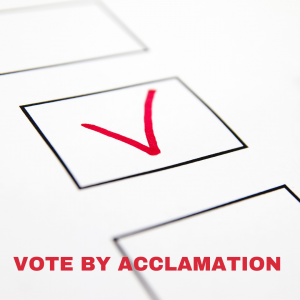 Did you Know?
Did you Know?
Deciphering the Election by Acclamation Process: A Sample Timeline
By Adrian Chiang, Esq.
 Did you Know?
Did you Know?
Deciphering the Election by Acclamation Process: A Sample Timeline
By Adrian Chiang, Esq.
Election-Year Etiquette: Tips for Keeping Board Meetings Civil
As we are living through an election year, we can expect heightened passion around political views, some of which may surface at our Community Association Board meetings. The energy and enthusiasm that come with election season can sometimes lead to heated debates and discussions.
While Board meetings are an excellent opportunity to address important community issues, they are not intended as platforms for political debate regarding local, state or federal issues. Nevertheless, avoiding political discussions entirely during this period might be challenging due to the current political climate. Open and respectful dialogue is valuable, but it is best conducted in appropriate settings designed for such discussions.
Did you Know?
The Required Steps Associations Must Take for a Successful Election by Acclamation
By Leena Danpour, Esq.
 When SB 323 took effect on January 1, 2020, it greatly modified the Davis-Stirling Common Interest Development Act’s election procedures, including timelines for conducting an election. In the process, it inadvertently created a conflict in the law regarding recall elections that community associations have been struggling with ever since.
When SB 323 took effect on January 1, 2020, it greatly modified the Davis-Stirling Common Interest Development Act’s election procedures, including timelines for conducting an election. In the process, it inadvertently created a conflict in the law regarding recall elections that community associations have been struggling with ever since.
Corporations Code §§ 7510 and 7511 state that when 5% of the members of a nonprofit mutual benefit corporation submit a written petition to the board of directors to request a special meeting of the members (which is basically the process for initiating a recall election), the board is required, within 20 days after it receives the petition, to schedule the special meeting on a date that is not fewer than 35 and not more than 90 days after the date it received the petition.
However, Civil Code § 5100 states that notwithstanding any other law (including the Corporations Code), community association elections legally requiring a member vote, including election and removal of directors, must be held by secret ballot in accordance with the Davis-Stirling Act’s election procedures, and Civil Code § 5115 provides a timeline for such elections that is at least 90 days.
 California community association attorneys, managers and others in the industry have differing opinions on how to properly and legally proceed with uncontested elections — elections in which the number of candidates is less than or equal to the number of board positions needed to be filled. Prior to 2020 when the election process and procedures were changed, the civil code did not expressly address voting by acclamation. Since 2020, the law has changed, permitting a vote by acclamation in narrow circumstances. Specifically, if an association is over six thousand units. We have heard that some attorneys are telling clients that they can still hold a vote by acclamation if their association has less than 6,000 units. We disagree.
California community association attorneys, managers and others in the industry have differing opinions on how to properly and legally proceed with uncontested elections — elections in which the number of candidates is less than or equal to the number of board positions needed to be filled. Prior to 2020 when the election process and procedures were changed, the civil code did not expressly address voting by acclamation. Since 2020, the law has changed, permitting a vote by acclamation in narrow circumstances. Specifically, if an association is over six thousand units. We have heard that some attorneys are telling clients that they can still hold a vote by acclamation if their association has less than 6,000 units. We disagree.
The California Civil Code requires, despite contrary provisions in an association’s governing documents or election rules, that all board member elections, including uncontested elections other than for associations that are 6,000 units or more, be conducted utilizing secret balloting. Associations must abide by these statutory requirements, including holding an election meeting and counting the ballots even if the number of candidates running is equal to or less than the number of board positions to be filled.
The primary, and perhaps most legally sound reason for abiding by formal procedure requirements is the language found in CA Civil Code 5100, which states that “(n)otwithstanding any other law or provision of the governing documents, elections regarding…election and removal of members of the association board of directors….shall be held by secret ballot in accordance with the procedures set forth in this section.” Surprisingly, however, not all community association attorneys agree that the word “shall” is mandatory, requiring that associations hold an election when, in their opinion, deeming the board voted in by acclamation as appropriate. But, there is strong legal precedent to the contrary and association’s would be remiss to follow this advice.
By David Swedelson, Senior Partner and Community Association Attorney at SwedelsonGottlieb
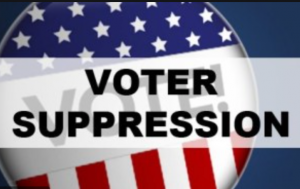 I first heard about voter suppression in law school, where I learned that the United States has a long tradition of threatening voter access. I thought it was a thing of the past. But I have been surprised by recent news stories that tell us that there are real efforts in 2020 to make it harder for some Americans to vote. For example, a Memphis, Tenn., poll worker turned away people wearing Black Lives Matter T-shirts, saying they couldn’t vote. Robocalls warned thousands of Michigan residents that mail-in voting could put their personal information in the hands of debt collectors and police. In Georgia, officials cut polling places by nearly 10%, even as the number of voters surged by nearly 2 million.
I first heard about voter suppression in law school, where I learned that the United States has a long tradition of threatening voter access. I thought it was a thing of the past. But I have been surprised by recent news stories that tell us that there are real efforts in 2020 to make it harder for some Americans to vote. For example, a Memphis, Tenn., poll worker turned away people wearing Black Lives Matter T-shirts, saying they couldn’t vote. Robocalls warned thousands of Michigan residents that mail-in voting could put their personal information in the hands of debt collectors and police. In Georgia, officials cut polling places by nearly 10%, even as the number of voters surged by nearly 2 million.
Simply stated, voter and candidate suppression is a strategy used to influence an election’s outcome by discouraging or preventing specific groups of people from running as a candidate in an election or voting. Unlike political campaigning, which attempts to change voting behavior through persuasion and organization, activating inactive voters, or registering new supporters; voter suppression attempts to reduce the number of voters who might vote against a candidate or proposition. The tactics of voter suppression range from minor changes to make voting less convenient, physical intimidation, and even physical attacks on prospective voters, which is illegal.
Prepared by the Community Association Attorneys at SwedelsonGottlieb
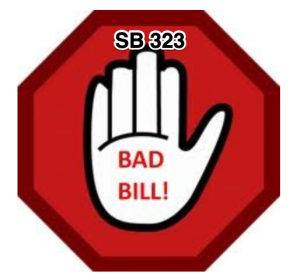
Senate Bill 323, proposed new law that would impact how California community association conduct elections, was approved by the Senate and Assembly was presented to Governor Newsom for his signature. This proposed legislation will impact and change the procedural requirements for most California community associations’ elections. Unfortunately, this proposed legislation goes too far and it is not the right solution to whatever it is that motivated Senator Wieckowski to author this new legislation.
For example, under current law, Civil Code Section 5200(a)(9), members of a community association can request their association’s list of members, including the members names and addresses. Currently Civil Code section 5220 allows members the ability to opt out and keep their contact information, which they deem private, off the list. SB 323 includes a loophole that effectively eliminates the ability for owners to opt out of having their name and personal contact information provided to another member. This proposed new law requires owners to provide their name and address on the envelope that includes the ballot, which SB 323 would make part of the list of records available for member inspection.
By: David Swedelson, Partner at SwedelsonGottlieb, Community Association Attorneys
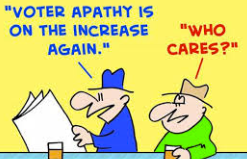 It is an old problem. Many California community associations cannot motivate their owners to participate or even vote at association elections. We have had clients that have been unable to obtain a quorum for director elections for more than 20 years. Even my own association recently reported a failure to achieve a quorum and decided not even to bother holding a second meeting, knowing that the chances of obtaining a quorum was remote.
It is an old problem. Many California community associations cannot motivate their owners to participate or even vote at association elections. We have had clients that have been unable to obtain a quorum for director elections for more than 20 years. Even my own association recently reported a failure to achieve a quorum and decided not even to bother holding a second meeting, knowing that the chances of obtaining a quorum was remote.
Some condominium and homeowner associations have the ability under their governing documents to reduce the required percentage for a quorum at adjourned meetings, often from 50% to 25%, but even then some of those associations cannot get 25% of the owners to vote.
Many board members and managers have told me that they believe this is a problem with community associations in general. The fact is that this is not just a problem for community associations; it is a problem for federal, state and local elections as well. A recent Los Angeles Times article stated that “alarmed that fewer than one fourth of voters are showing up for municipal elections, the Los Angeles Ethics Commission voted… to recommend that the City Council look at using cash prizes to lure more people to the polls.”
Continue reading
By Cyrus Koochek, Esq., Associate Attorney, SwedelsonGottlieb, Community Association Attorneys
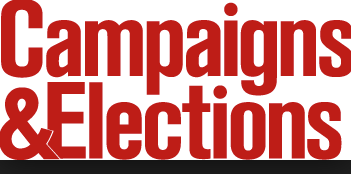 Every board of directors for every condo or homeowners association has been there; the board wants to do something that it should be “obvious” that the association needs, such as a needed capital improvement to the common area, or an important amendment to the CC&Rs, but cannot muster up the required amount of homeowner votes to approve this “obvious” need. Whether this failure of approval results from the homeowners’ true opposition to the proposed change or whether it stems from owner apathy, a recent California court decision has made it clear that when the board advocates for votes for the approval of whatever is on the ballot, the board is a candidate, and as such, must provide equal access to media and the common area for others to advocate their positions on the ballot measure.
Every board of directors for every condo or homeowners association has been there; the board wants to do something that it should be “obvious” that the association needs, such as a needed capital improvement to the common area, or an important amendment to the CC&Rs, but cannot muster up the required amount of homeowner votes to approve this “obvious” need. Whether this failure of approval results from the homeowners’ true opposition to the proposed change or whether it stems from owner apathy, a recent California court decision has made it clear that when the board advocates for votes for the approval of whatever is on the ballot, the board is a candidate, and as such, must provide equal access to media and the common area for others to advocate their positions on the ballot measure.
On June 26, 2013, the California Court of Appeal (4th Appellate District) filed its decision in Wittenberg v. Beachwalk Homeowners Association holding that the board of directors of the Beachwalk Homeowners Association violated California Civil Code Sections 1363.03(a)(1) and 1363.03(a)(2), which state that association media (website, newsletters, etc.) and common areas (areas where notices are posted, etc.), respectively, must be equally accessible to all members during a campaign as long as any one member advocating a point of view is provided access to such media or common areas. Based on the court’s interpretation of these Civil Code sections, all boards must be extremely mindful of their actions during an election or voting process.
Blog post by Sandra Gottlieb, community association attorney and Senior Partner at SwedelsonGottlieb
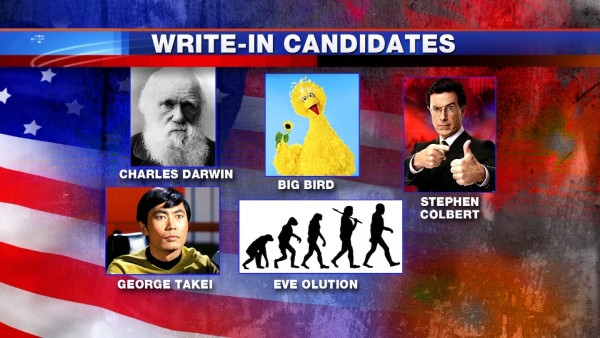 California community association attorneys, managers and others in the industry have differing opinions on how to properly and legally proceed with uncontested elections – elections in which the number of candidates is less than or equal to the number of board positions needed to be filled. Prior to 2006 when the election process and procedures were changed and secret elections were mandated, the answer was simple. No election was required, and candidates were deemed the elected board by way of acclamation. Since 2006, the law has changed, and elections must be held by way of a secret ballot process. Some attorneys know that the days of deeming the board elected by acclamation are over; others think the opposite.
California community association attorneys, managers and others in the industry have differing opinions on how to properly and legally proceed with uncontested elections – elections in which the number of candidates is less than or equal to the number of board positions needed to be filled. Prior to 2006 when the election process and procedures were changed and secret elections were mandated, the answer was simple. No election was required, and candidates were deemed the elected board by way of acclamation. Since 2006, the law has changed, and elections must be held by way of a secret ballot process. Some attorneys know that the days of deeming the board elected by acclamation are over; others think the opposite.
Continue reading